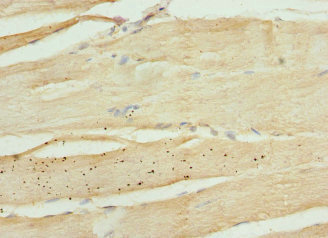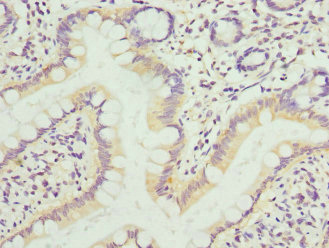Function
Motor for anterograde transport of mitochondria. Has a microtubule plus end-directed motility. Isoform 2 is required for induction of neuronal apoptosis.; Isoform 1 mediates the transport of synaptic vesicles in neuronal cells.
Gene References into Functions
- In conclusion, using a panel including 17 susceptibility genes, we documented the presence of somatic mutations in over 50% of pheochromocytomas and paragangliomas (PPGL). We confirmed the high frequency of NF1 somatic mutations and identified KIF1B as the second most frequently mutated gene in PPGL tissues. PMID: 28515046
- The rs17401966 polymorphism reduced the risk for HCC under the allele, heterozygous, homozygous, and dominant models but not under the additive or recessive models. PMID: 28427253
- BORC and Arl8 function upstream of two structurally distinct kinesin types: kinesin-1 (KIF5B) and kinesin-3 (KIF1Bbeta and KIF1A). PMID: 27851960
- The gene-environment interaction between the KIF1B rs17401966 variant and alcohol consumption may contribute to the development of hepatocellular carcinoma in Chinese individuals. PMID: 27122668
- Increased KIF1B was associated with worse WHO pathological classification, Karnofsky performance status, and prognosis. Silencing KIF1B inhibited expression of membranal MT1-MMP. PMID: 26576027
- Downregulation of KIF1B in hepatocellular carcinoma tissues is associated with poor prognosis. PMID: 26217094
- the rs17401966 polymorphism likely regulates KIF1B mRNA expression and thus may be associated with epithelial ovarian cancer risk in Eastern Chinese women. PMID: 25854172
- The tumor suppressor DLC2 and Kif1B are central components of a signaling network that guides spindle positioning, cell-cell adhesion and mitotic fidelity. PMID: 25518808
- Results from targeted sequencing in patients with acute lymphoblastic leukemia identified KMT2D and KIF1B as novel putative driver genes and a putative regulatory non-coding variant that coincided with overexpression of the growth factor MDK. PMID: 25355294
- The variant G allele of rs17401966 may be a favorable biomarker for the prognosis of intermediate or advanced hepatitis B virus-related hepatocellular carcinoma patients in this Chinese population PMID: 25153661
- the KIF1B gene SNP (rs174019660) showed no significant association with HBV-related hepatocellular carcinoma in Thai patients infected with HBV, indicating that there must be other mechanisms or pathways involved in hepatocellular carcinoma. PMID: 23803045
- The meta-analysis showed a significant association between kinesin family member 1B (KIF1B) single nucleotide polymorphism (rs17401966) and hepatocellular carcinoma (HCC). PMID: 24952890
- Results show that KIF1Bbeta has neuroblastoma tumor-suppressor properties and promotes and requires nuclear-localized DHX9 for its apoptotic function by activating XAF1 expression. PMID: 24469107
- KIF1B may play a critical role in the development of hepatocellular carcinoma PMID: 23634229
- Leptin, MT1-MMP and KIF1B are overexpressed in GC tissues. PMID: 23354307
- the TT genotype of rs1535045 was associated with a slower progression of MS and early MS onset. PMID: 23528589
- activity-dependent synaptic recruitment of KIF1Bbeta, its interaction with Ca(2 ) sensor Calmodulin and its role as a dendritic motor of ribonucleoprotein complexes provide a novel basis for understanding the coordination of motor protein mobilization and synaptic signaling pathways PMID: 22945799
- Polymorphisms at KIF1B gene locus investigated in this study showed no significant association with Hepatitis B virus infection. PMID: 23028799
- This study showed the new locus identified for hepatocellular carcinoma, KIF1B, was not associated with progression to chronic hepatitis B. PMID: 22363396
- No association is found between rs10492972 KIF1B polymorphism and the progression of multiple sclerosis in Greek subjects. PMID: 21424745
- Polymorphic locus rs10492972 of the KIF1B gene associates with multiple sclerosis in Russia. PMID: 21680216
- analysis of the KIF1B rs10492972*C allelic association in multiple sclerosis PMID: 21594895
- Data show that no evidence could be found for a determining influence of carriership of the risk allele or genotype of the KIF1B gene on any of the multiple sclerosis neurodegenerative phenotypic markers studied. PMID: 21606458
- KIF1B rs10492972 allelic variant does not act as a risk factor as well as a disease modifier in a Italian cohort of patients with progressive relapsing multiple sclerosis. PMID: 20067515
- Bmi1 is a MYCN target gene that regulates tumorigenesis through repression of KIF1Bbeta and TSLC1 in neuroblastoma. PMID: 20190806
- KIF1Ba in addition to KIF1Bbeta may not be a candidate tumor suppressor gene for neuroblastoma PMID: 12888911
- KBP is a new binding partner for KIF1Balpha that is a regulator of its transport function and thus represents a new type of kinesin interacting protein. PMID: 16225668
- We detected ALS-specific down-regulation of KIF1Bbeta and novel KIF3Abeta, two isoforms we show to be enriched in the brain, and also of SOD1, a key enzyme linked to familial ALS. PMID: 17418584
- Study identified inherited loss-of-function KIF1Bbeta missense mutations in neuroblastomas and pheochromocytomas and an acquired loss-of-function mutation in a medulloblastoma. PMID: 18334619
- KIF1Bbeta may act as a haploinsufficient tumor suppressor, and its allelic loss may be involved in the pathogenesis of neuroblastoma and other cancers. PMID: 18614535
- a germline mutation in the KIF1B beta gene on 1p36 may have a role in neural and nonneural tumors PMID: 18726616
- Study reports a genome wide association study identifying a new locus replicated in 2,679 cases and 3,125 controls; an rs10492972[C] variant located in the KIF1B gene was associated with MS with an odds ratio of 1.35 (P = 2.5 x 10(-10)). PMID: 18997785
Show More
Hide All
Involvement in disease
Charcot-Marie-Tooth disease 2A1 (CMT2A1); Neuroblastoma 1 (NBLST1); Pheochromocytoma (PCC)
Subcellular Location
Cytoplasm, cytoskeleton. Mitochondrion. Cell projection, axon.; [Isoform 1]: Cytoplasmic vesicle, secretory vesicle, synaptic vesicle.
Protein Families
TRAFAC class myosin-kinesin ATPase superfamily, Kinesin family, Unc-104 subfamily
Tissue Specificity
Isoform 3 is abundant in the skeletal muscle. It is also expressed in fetal brain, lung and kidney, and adult heart, placenta, testis, ovary and small intestine. Isoform 2 is abundant in the brain and also expressed in fetal heart, lung, liver and kidney,







